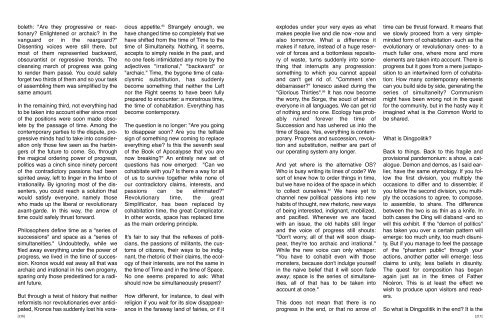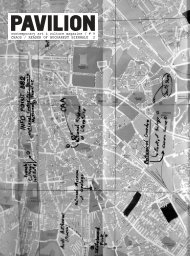PAVILION
PAVILION
PAVILION
- No tags were found...
You also want an ePaper? Increase the reach of your titles
YUMPU automatically turns print PDFs into web optimized ePapers that Google loves.
oleth: "Are they progressive or reactionary?<br />
Enlightened or archaic? In the<br />
vanguard or in the rearguard?"<br />
Dissenting voices were still there, but<br />
most of them represented backward,<br />
obscurantist or regressive trends. The<br />
cleansing march of progress was going<br />
to render them passé. You could safely<br />
forget two thirds of them and so your task<br />
of assembling them was simplified by the<br />
same amount.<br />
In the remaining third, not everything had<br />
to be taken into account either since most<br />
of the positions were soon made obsolete<br />
by the passage of time. Among the<br />
contemporary parties to the dispute, progressive<br />
minds had to take into consideration<br />
only those few seen as the harbingers<br />
of the future to come. So, through<br />
the magical ordering power of progress,<br />
politics was a cinch since ninety percent<br />
of the contradictory passions had been<br />
spirited away, left to linger in the limbo of<br />
irrationality. By ignoring most of the dissenters,<br />
you could reach a solution that<br />
would satisfy everyone, namely those<br />
who made up the liberal or revolutionary<br />
avant-garde. In this way, the arrow of<br />
time could safely thrust forward.<br />
Philosophers define time as a "series of<br />
successions" and space as a "series of<br />
simultaneities." Undoubtedly, while we<br />
filed away everything under the power of<br />
progress, we lived in the time of succession.<br />
Kronos would eat away all that was<br />
archaic and irrational in his own progeny,<br />
sparing only those predestined for a radiant<br />
future.<br />
But through a twist of history that neither<br />
reformists nor revolutionaries ever anticipated,<br />
Kronos has suddenly lost his voracious<br />
appetite. 85 Strangely enough, we<br />
have changed time so completely that we<br />
have shifted from the time of Time to the<br />
time of Simultaneity. Nothing, it seems,<br />
accepts to simply reside in the past, and<br />
no one feels intimidated any more by the<br />
adjectives "irrational," "backward" or<br />
"archaic." Time, the bygone time of cataclysmic<br />
substitution, has suddenly<br />
become something that neither the Left<br />
nor the Right seems to have been fully<br />
prepared to encounter: a monstrous time,<br />
the time of cohabitation. Everything has<br />
become contemporary.<br />
The question is no longer: "Are you going<br />
to disappear soon? Are you the telltale<br />
sign of something new coming to replace<br />
everything else? Is this the seventh seal<br />
of the Book of Apocalypse that you are<br />
now breaking?" An entirely new set of<br />
questions has now emerged: "Can we<br />
cohabitate with you? Is there a way for all<br />
of us to survive together while none of<br />
our contradictory claims, interests, and<br />
passions can be eliminated?"<br />
Revolutionary time, the great<br />
Simplificator, has been replaced by<br />
cohabitation time, the great Complicator.<br />
In other words, space has replaced time<br />
as the main ordering principle.<br />
It's fair to say that the reflexes of politicians,<br />
the passions of militants, the customs<br />
of citizens, their ways to be indignant,<br />
the rhetoric of their claims, the ecology<br />
of their interests, are not the same in<br />
the time of Time and in the time of Space.<br />
No one seems prepared to ask: What<br />
should now be simultaneously present?<br />
How different, for instance, to deal with<br />
religion if you wait for its slow disappearance<br />
in the faraway land of fairies, or if it<br />
explodes under your very eyes as what<br />
makes people live and die now -now and<br />
also tomorrow. What a difference it<br />
makes if nature, instead of a huge reservoir<br />
of forces and a bottomless repository<br />
of waste, turns suddenly into something<br />
that interrupts any progression:<br />
something to which you cannot appeal<br />
and can't get rid of. "Comment s'en<br />
débarrasser?" Ionesco asked during the<br />
"Glorious Thirties". 86 It has now become<br />
the worry, the Sorge, the souci of almost<br />
everyone in all languages. We can get rid<br />
of nothing and no one. Ecology has probably<br />
ruined forever the time of<br />
Succession and has ushered us into the<br />
time of Space. Yes, everything is contemporary.<br />
Progress and succession, revolution<br />
and substitution, neither are part of<br />
our operating system any longer.<br />
And yet where is the alternative OS?<br />
Who is busy writing its lines of code? We<br />
sort of knew how to order things in time,<br />
but we have no idea of the space in which<br />
to collect ourselves. 87 We have yet to<br />
channel new political passions into new<br />
habits of thought, new rhetoric, new ways<br />
of being interested, indignant, mobilized,<br />
and pacified. Whenever we are faced<br />
with an issue, the old habits still linger<br />
and the voice of progress still shouts:<br />
"Don't worry, all of that will soon disappear,<br />
they're too archaic and irrational."<br />
While the new voice can only whisper:<br />
"You have to cohabit even with those<br />
monsters, because don't indulge yourself<br />
in the naive belief that it will soon fade<br />
away; space is the series of simultaneities,<br />
all of that has to be taken into<br />
account at once."<br />
This does not mean that there is no<br />
progress in the end, or that no arrow of<br />
time can be thrust forward. It means that<br />
we slowly proceed from a very simpleminded<br />
form of cohabitation -such as the<br />
evolutionary or revolutionary ones- to a<br />
much fuller one, where more and more<br />
elements are taken into account. There is<br />
progress but it goes from a mere juxtaposition<br />
to an intertwined form of cohabitation:<br />
How many contemporary elements<br />
can you build side by side, generating the<br />
series of simultaneity? Communism<br />
might have been wrong not in the quest<br />
for the community, but in the hasty way it<br />
imagined what is the Common World to<br />
be shared.<br />
What is Dingpolitik?<br />
Back to things. Back to this fragile and<br />
provisional pandemonium: a show, a catalogue.<br />
Demon and demos, as I said earlier,<br />
have the same etymology. If you follow<br />
the first division, you multiply the<br />
occasions to differ and to dissemble; if<br />
you follow the second division, you multiply<br />
the occasions to agree, to compose,<br />
to assemble, to share. The difference<br />
between the two is as thin as a knife. In<br />
both cases the Ding will disband -and so<br />
will this exhibit. If the "demon of politics"<br />
has taken you over a certain pattern will<br />
emerge: too much unity, too much disunity.<br />
But if you manage to feel the passage<br />
of the "phantom public" through your<br />
actions, another patter will emerge: less<br />
claims to unity, less beliefs in disunity.<br />
The quest for composition has began<br />
again just as in the times of Father<br />
Nicéron. This is at least the effect we<br />
wish to produce upon visitors and readers.<br />
So what is Dingpolitik in the end? It is the<br />
[216]<br />
[217]








